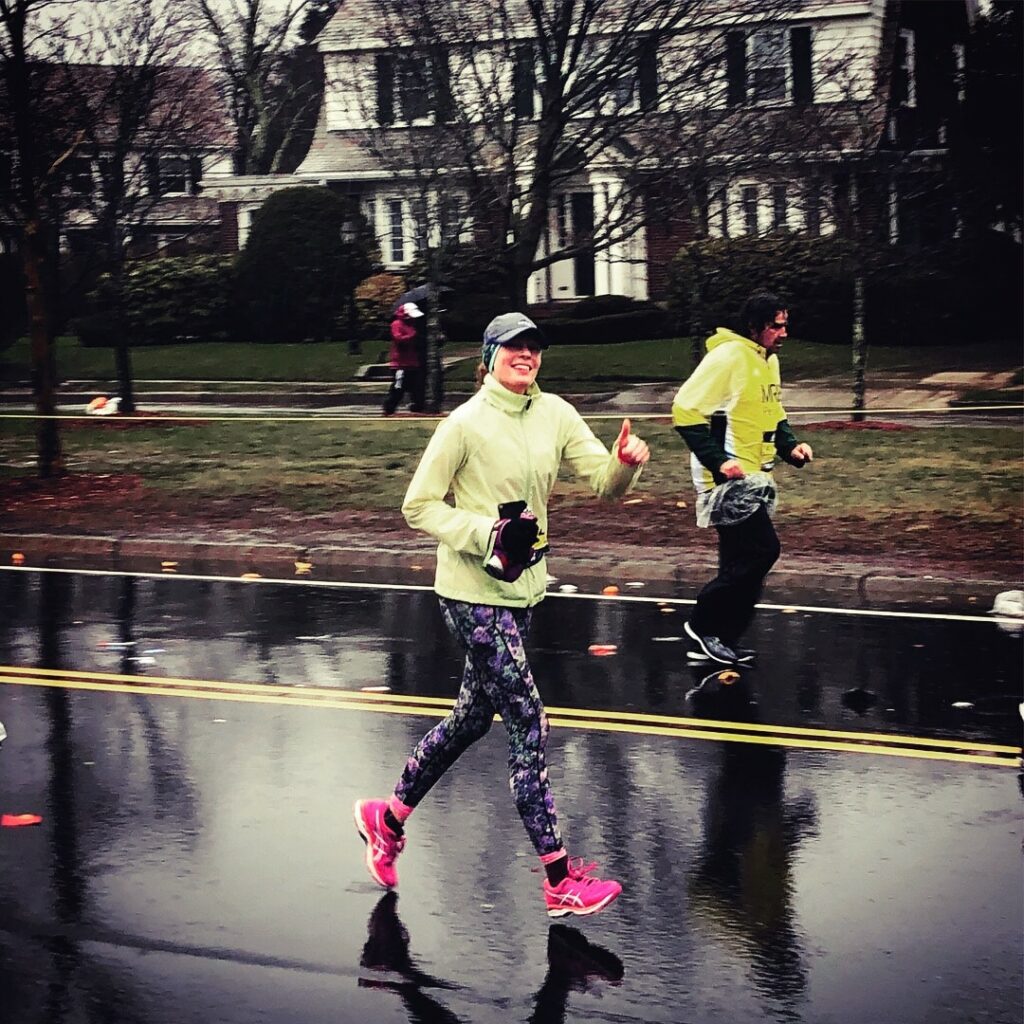Every year since 2014, I have run a marathon. I planned on continuing my streak in 2020. I had my race picked out, my new running shoes purchased. Little did I know that my 2020 marathon wouldn’t be a running race at all. Instead, it would be my battle against cancer.
From the get-go, 2020 has not gone according to plan. On January 2nd, I got sick. Lying on the bathroom floor next to the toilet in a cold sweat sick. I thought I had caught a really bad stomach flu, when really, though I had no idea at the time, it was my Hodgkin Lymphoma making its first official appearance. Although my year was not off to a good start, I think of myself as an optimist and figured I would be back on my feet in no time. I could not have been more wrong.
Over the next few weeks, my body still felt off. I was tired, groggy, and achy. My husband had gotten what we thought was the same stomach bug, but he recovered quickly while I had a lingering cough and laryngitis. I got a strep test at urgent care. It came back negative. I had only gone on one run so far in January, and it felt horrible. Something wasn’t right.
I went to a second urgent care. My cough was even worse – a deep, chesty, painful croak. This was pre-COVID, and I thought I had walking pneumonia. I figured a quick X-Ray and I would be on my way to the pharmacy for some antibiotics.
It was alone in the urgent care where I toed the startline of my cancer marathon, without knowing that I signed up. The X-Ray revealed a lump in my chest. I would need to make an appointment with my primary care doctor ASAP. I cried so hard I got a nosebleed.
As a distance runner, I am used to perseverance. I am used to getting uncomfortable, of pushing my body just past the point of exhaustion and still having miles to go. I have spent hours by myself, in my own head, one foot after another, on training runs. I have had runs where I feel amazing, light and strong, and runs where every step is a slog, ones where I’ve vomited or fallen, ones where all I want to do is call somebody to come pick me up. I thought the miles I spent pounding the pavement would make me prepared for anything. I thought that running the 2018 Boston Marathon in an unrelenting downpour, which was, at the time, the hardest thing I had ever done, made me strong in the face of any challenge. But cancer requires a different kind of strength. It is not physical, it is mental, and there are no training runs. The race starts, and you go.
I guess if there was any training period for cancer, it would have been the month before my first chemotherapy treatment. Just like how I have a mileage and workout schedule for each week of marathon training, I had a schedule of doctors appointments, tests, scans, blood draws, pre-medications and my biopsy. During those weeks, much in the same way I mentally prepare for a race, I was trying to prepare for chemo. With running, I know what to expect. I can visual certain points in the race. But entering chemo, I couldn’t visualize anything. I had no idea what would happen. I felt like a bandit runner who jumped in at the start of the marathon, with no water or snacks, who thinks “how bad can 26.2 miles be, really?”
The first six miles of the run are generally the easiest for me. My body is fresh, my mind excited. While I knew my first chemo would be hard, I figured it would be like the first six miles – a chance to settle in and learn the course. Boy, was I wrong.
My first chemo kicked my butt. It felt like mile 20, when I am fatigued, legs screaming at me and my mind telling me to give up. The five hours I spent in my infusion – which, ironically, is the time I have run four of my seven marathons in – destroyed me. I don’t even remember the walk back to the car, and when I got home, I got a fever of 103. I had not trained for this. How does anybody train for cancer?
But just like with running, I quickly learned that there are ways to prepare for chemo to make it not as hard (key word being “as”). I learned what combination of pills to take and when to help with my nausea. I learned what foods to avoid, and which ones would taste good. In fact, my pre-chemo dinner was basically my pre-marathon dinner: pasta, meatballs and veggies. I learned that staying hydrated was absolutely necessary. Although running didn’t feel good, I was gifted an indoor spin bike from the studio I frequent, and I quickly learned what days I would feel okay on the bike, and what days should be rest days. It was all trial and error, much like my very first running marathon.
Eventually, chemo got more manageable. It was one foot in front of the other, like in a race. As I went on, the parallels between my marathons and chemo became clearer and stronger. In addition to my average marathon time being my infusion time, my fourth infusion, my halfway point, was on April 16th, the day I ran the Boston Marathon two years ago. I was in treatment for 16 weeks – I typically follow 16 week running training plans. I had eight chemo cycles – this year would have been my eighth marathon. It became increasingly clear: my marathon streak was not broken in 2020. My eighth marathon was my cancer.
At the end of every race, as I cross the finish line, I burst into tears. It is a reflexive act. Not one of sadness, but of raw, unfiltered joy. A celebration of my body and my mind, a recognition of the physical and emotional strength that allowed my body to carry me 26.2 miles. As I walked out of my last infusion, I cried those same tears. The hardest miles of my life so far were behind me.
By Gaby Berkman

